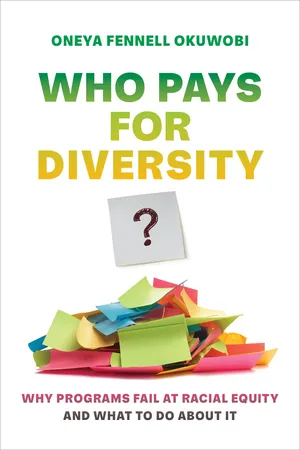
Who Pays for Diversity?
Why Programs Fail at Racial Equity and What to Do about It
- 319 pages
- English
- ePUB (mobile friendly)
- Available on iOS & Android
Who Pays for Diversity?
Why Programs Fail at Racial Equity and What to Do about It
About this book
How diversity initiatives harm employees of color by turning them into workplace commodities. Diversity programs are under attack. Should those interested in racial justice fight to keep them, or might there be another way forward? Who Pays for Diversity? reveals the costs that employees of color pay under current programs by having their racial identities commodified to benefit white people and institutions.Oneya Fennell Okuwobi proposes fresh and thoughtful ways to reorient these initiatives, move beyond tokenism, and authentically center marginalized employees. Drawing on accounts of employees from across the workplace spectrum, from corporations to churches to universities, Who Pays for Diversity? details how the optics of diversity programs undermine employees' competence while diminishing their well-being and workplace productivity. Okuwobi argues that diversity programs have been a costly detour on the path to racial justice, and getting back on track requires solutions that provide equity, dignity, and agency to all employees, instead of defending the status quo.
Frequently asked questions
- Essential is ideal for learners and professionals who enjoy exploring a wide range of subjects. Access the Essential Library with 800,000+ trusted titles and best-sellers across business, personal growth, and the humanities. Includes unlimited reading time and Standard Read Aloud voice.
- Complete: Perfect for advanced learners and researchers needing full, unrestricted access. Unlock 1.4M+ books across hundreds of subjects, including academic and specialized titles. The Complete Plan also includes advanced features like Premium Read Aloud and Research Assistant.
Please note we cannot support devices running on iOS 13 and Android 7 or earlier. Learn more about using the app.
Information
Table of contents
- Title
- Copyright
- Dedication
- Contents
- Acknowledgments
- 1. The Costs of Diversity
- 2. Commodities and Tokens
- 3. One of the Things about Bridges Is They Get Walked On
- 4. Honorary Whites and Collective Blacks: Degrees of Diversity
- 5. “I’m Improving It for Us”: Diversity Ideology for Employees of Color
- 6. Making Diversity the Only Option
- 7. Formal Diversity Practices
- 8. Dreaming Bigger: Toward Workplace Equity
- Appendix 1: Study Participants
- Appendix 2: Interview Guide
- Notes
- References
- Index